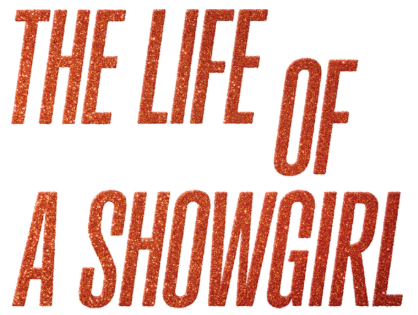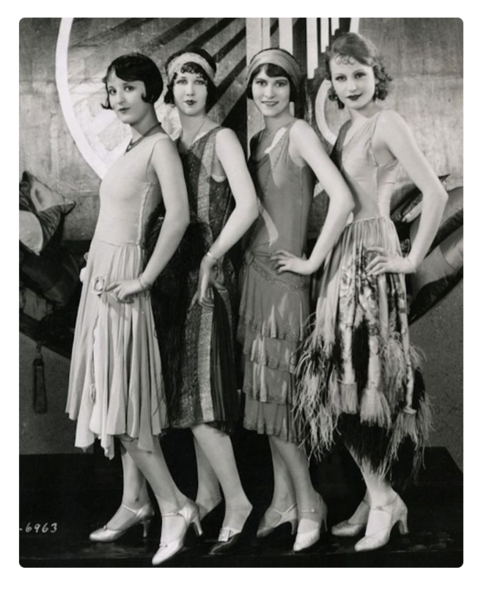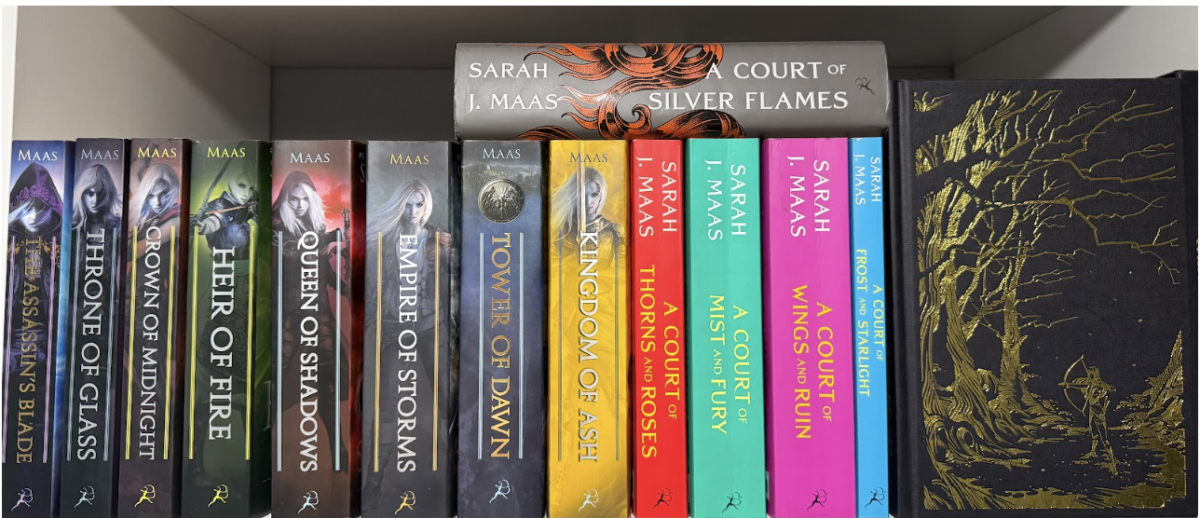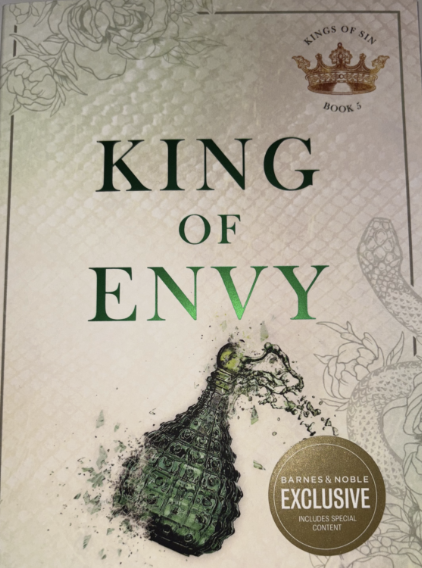Overall Ranking — 9/10
After years of heartbreak ballads and poetic confessions, Taylor Swift’s The Life of a Showgirl feels like a glitter-drenched exhale — lighter, brighter, and just unapologetically happy. But beneath the rhinestones and rehearsal lights, she doesn’t let us forget the price of performance. The album explores the juxtaposition between the radiance of being a woman in the spotlight and the shadows that trail behind. It’s an album that laughs louder and sparkles harder, but still remembers the cost of that shine.
While many fans expected this album to align with her past works, specifically through her poetic lyricism and intricate storytelling, this album takes a different approach. It’s not so much about deep metaphors or heartbreak dissections as it is about joy. She’s swapped out her fountain pen for a glitter gel pen (a term she’s used in the past to describe her more upbeat, carefree pop songs), leaving fans an album full of sparkle. Yes, the album still has some emotional depth, as discussed previously, but it’s presented through a much lighter lens.
Some listeners have criticized this shift as shallow or less meaningful, which feels tone-deaf at best. For an artist who’s spent years exploring heartbreak and even referencing suicidal thoughts, choosing joy shouldn’t be a downgrade; it’s the victory Swift’s always deserved. With that in mind, let’s dive into the songs that bring this glittering transformation to life.
“The Fate of Ophelia” — 10/10
“Elizabeth Taylor” — 9.5/10
“Opalite” — 9.5/10
“Father Figure” — 8/10
“Eldest Daughter” — 9/10
“Ruin the Friendship” — 9.5/10
“Actually Romantic” — 8.5/10
“Wi$h Li$t” — 7/10
“Wood” — 8.5/10
“Cancelled!” — 8.5/10
“Honey” — 8/10
“The Life of a Showgirl (feat. Sabrina Carpenter)” — 10/10
“The Fate of Ophelia” — 10/10
“Ophelia lived in fantasy / But love was a cold bed full of scorpions / The venom stole her sanity”
In “The Fate of Ophelia” Swift revisits one of literature’s most tragic women, rewriting her story to show a version where she’s saved by love, instead of destroyed by it. The song directly references Ophelia from Shakespeare’s Hamlet, a woman driven to madness by the men around her. Her desperate need to please them, combined with Hamlet’s cruelty, consumes her with grief and ultimately leads her to drown herself. Swift transforms that ending; her Ophelia still bears the scars of love, but in the end is met with tenderness instead of tragedy. The song feels like Swift reclaiming not only Ophelia’s fate, but her own. The lines “You dug me out of my grave and / Saved my heart from the fate of Ophelia” and “If you’d never come for me / I might’ve drowned in the melancholy” are a direct reference to her newfound happiness in a safe and steady relationship. The perfection of this track transcends its lyrics and the meaning behind them; the layered vocals, the bouncy beat, and catchy chorus make it captivating from the moment the melody begins. As striking as the beginning is, it’s the ending that truly cements its 10/10 rating — from the layered whisper-singing in the bridge to the riffs on “me” and “Ophelia” when transitioning from the bridge to chorus. The closing repetition drives home the idea that, for once, Ophelia doesn’t sink beneath the surface — and if we’re being honest, it’s been on repeat the entire time we’ve been writing this piece.
“Elizabeth Taylor” — 9.5/10
“Oftentimes, it doesn’t feel so glamorous to be me”
Throughout this track, Taylor Swift makes not-so-subtle references to old Hollywood starlet, Elizabeth Taylor. As it happens, they have more in common than just a name. The bass-heavy chorus resonates with fans, capturing both the glamour and exhaustion of fame, as well as the ache of endlessly seeking true love in a world that turns every romance into a spectacle. In paralleling herself with Elizabeth Taylor, another woman defined and dissected by her relationships, Swift crafts a portrait of two icons chasing something real amidst the glitter. The line “cry my eyes violet” nods to Elizabeth Taylor’s distinctive violet-tinged eyes and, in Swift’s hands, transforms into an image of crying so hard her blue eyes get rubbed red, ultimately turning violet. We see “Elizabeth Taylor” as a beautifully crafted song with an interesting message. We deducted half a point only because it didn’t feel right to give this song the same rating we gave some others, such as “The Fate of Ophelia.”

“Opalite” — 9.5/10
“You had to make your own sunshine / But now the sky is opalite”
“Opalite” is one of the happiest, most upbeat songs on the new album. It’s a track about creating your own joy after heartbreak and finding someone that makes it possible for you to do so. The title itself is full of symbolism: opalite is a man-made glass version of opal, associated with healing, transformation, and new beginnings. The production feels light and dreamy, giving the song a warmth that matches its message. We found the track very catchy with lines like “You were dancing through the lighting strikes” getting stuck in our heads. Both lyrically and sonically, it captures the freedom that comes with letting go of pain and choosing happiness instead. The elation in this song is infectious, radiating sunshine from start to finish. To us, this song is the literal definition of a glitter gel pen song.
“Father Figure” — 8/10
“I pay the check before it kisses the mahogany grain / Said, ‘They wanna see you rise, they don’t want you to reign’”
In “Father Figure,” Swift uses dual perspectives to take us on a journey that reeks of designer leather and hundred-dollar bills. This song describes the ever-present exploitation in the music industry and the coexistence of toxic power dynamics. It is obvious to fellow Swifties that this song is about Scott Borschetta, the owner of Swift’s old record label, who is implicated in the ‘theft’ of her masters. As of May 30th, 2025, Swift now owns all of her music to date. This likely inspired her to write this song about pushing through the pain, which is the universal father figure experience. In comparison to some other tracks on The Life of a Showgirl, “Father Figure” seemed one-note and rather dark for our liking. We decided that it would be wrong to place this song in the same category as those others.

“Eldest Daughter” — 9/10
“And things I said were dumb / ‘Cause I thought that I’d never find that beautiful, beautiful life that / Shimmers that innocent light back”
“Eldest Daughter” is one of the most self-aware songs on the album, reflecting on pressure, expectation, and identity. It’s the ballad of the record, being the most like her previous album, The Tortured Poets Department. Swift captures what it feels like to be the person everyone looks to for strength, even when she’s quietly unraveling under the weight of it all. The line “Pretty soon I learned cautious discretion / When your first crush crushes something kind / When I said I don’t believe in marriage / That was a lie” perfectly captures growing up and feeling the need to act a certain way or wear a certain disguise in order to protect yourself from the world. The song has faced criticism for using what some people have called “cringe” phrases, but we felt that was precisely the point. Swift leans into the awkwardness, deliberately echoing the language the internet uses: buzzwords and tropes that feel off because they are. It’s commentary on perception and the uneasy balance between authenticity and expectation. The bridge, however, is where the song truly shines. It’s raw and cathartic, her voice trembling. We can’t listen to it without singing along at full volume. Vulnerable, layered, and achingly honest, “Eldest Daughter” earns a well-deserved 9/10.
“Ruin the Friendship” — 9.5/10
“And my advice is to always answer the question / Better that than to ask it all your life”
Fans of Taylor Swift’s “old music,” arise! During our joint listening party in the (unreasonably) early morning hours, we were quick to note that “Ruin the Friendship” appeared to continue the story originally started in “Fifteen.” From her 2008 Fearless album, “Fifteen” captured Swift’s wide-eyed innocence as a freshman in high school — and one of the key figures in that story, Abigail (mentioned by name in “Fifteen”), reappears here for the first time in seventeen years. It’s a full circle moment that sent fans spiraling into lyrical analysis and emotional nostalgia. Musically, “Ruin the Friendship” blends the warmth of her early country-pop roots with a modern edge. The twangy synth, clean vocal runs, and youthful sound of this song felt reminiscent of early albums such as Taylor Swift, Fearless, and Speak Now. Notably, we both loved the low vocal run on “eighty-five” and “prom” in the first and second verses; they’re subtle but stunning and so fun to sing along to. The bridge of this track feels like a sucker punch to the gut, due to the story taking a sharp dark turn by detailing a terrible tragedy. Now, we are all for storytelling, but this quick turnaround felt jarring and left us with our jaws on the floor. The ironic lyrics convey Swift’s longing to “ruin” a friendship (by telling the subject that she is in love with him) before the friendship is ruined by the inevitability of his suicide years after the fact.

“Actually Romantic” — 8.5/10
“And I know you think it comes off vicious / But it’s precious, adorable”
In this song, we discover that Swift has returned to shaking off the haters after a year of misery with The Tortured Poets Department. The first thundering verse and teasing chorus in “Actually Romantic” may appear like a cheesy love song at first glance, however, listeners are quick to realize that what begins as a bubbly love song quickly twists into something far more self-aware. It is a wink to those who have mocked her for being successful. The production shines with synth while her lyrics cut through like a knife, balancing humor and heartbreak in a beautiful way. As you listen, this track becomes less of a love song and more about reclaiming the right to express our emotions. This song reminds fans Swift still has that pop sparkle about her – while her cutthroat lyricism rips its very essence to shreds.
“Wi$h Li$t” — 7/10
“I thought I had it right, once, twice, but I did not / You caught me off my guard”
“Wi$h Li$t” reflects on what truly matters once the noise fades and spotlight dims. Swift contrasts the surface-level glamour of success with the quiet fulfillment that comes from finding something genuine. The song’s message is clear: the things that last aren’t the ones you can buy or win; they’re the ones that make you feel at home. The production mirrors that simplicity, with soft synth and a steady percussion. While we appreciate the message, we didn’t find as much enjoyment in listening to it as some of the other songs on the album. Additionally, the melody and lyrics felt somewhat basic and repetitive, leading to the song feeling somewhat plain.
“Wood” — 8.5/10
“Seems to be that you and me / We make our own luck”
In this track, reminiscent of the Jackson 5, we spied a continuation of Swift’s fascination with fate and folklore. The song leans into popular superstitions perpetuated by society, such as black cats, stepping over cracks, or knocking on wood for luck. Over groovy guitar and a quick beat, Swift revisits her take on love as a blessing and a curse, as someone who finally comprehends the nuances behind positive relationships. Her lyrics suggest that maybe true affection isn’t in the superstition, but in choosing to dive in headfirst regardless. “Wood” feels intimate and rooted in the language of vulnerability and understanding. There isn’t a single bad thing we can point out in the song, but once again, we didn’t feel like it lived up to some of the others.
“CANCELLED!” — 8.5/10
“But they’d already picked out your grave and hearse / Beware the wrath of masked crusaders”
Did somebody say Reputation? “Cancelled” channels the dark, electric energy of Swift’s Reputation era, brimming with sharp wit and simmering defiance. It’s a track about taking back control of a narrative that’s been twisted, while also touching on how easy it is to judge others. The production is bold and cinematic, driven by a pounding bass that perfectly matches the song’s unapologetic bite. The song references a lot of the scrutiny and hate Swift herself faced in the past, after public controversies turned her into a target. But instead of wallowing in resentment, Swift is playfully snarky in the song. It’s slick, fiery, and catchy. However, in our eyes it didn’t cut as lyrically deep as some of the album’s standouts, ultimately earning it its 8.5/10 rating.
“Honey” — 8/10
“They were sayin’ that skirt don’t fit me / And I cried the whole way home”
This track explores how language and affection collide when you’ve been hurt by words before. Swift writes about how a pet name, namely honey, can be weaponized — passive-aggressive and dismissive — but also about what it means when someone uses it out of sincerity. It feels like commentary on society’s tendency to sugarcoat cruelty, to disguise manipulation and power under something sweet. Yet beneath the critique, there’s hope: the idea that softness can be reclaimed, that words once used to wound can become symbols of love again. The melody and vocals are straightforward — nothing groundbreaking, but steady and warm — making “Honey” a song we wouldn’t skip, even if it doesn’t quite demand the replay button.
“The Life of a Showgirl (feat. Sabrina Carpenter)” — 10/10
“You don’t know the life of a showgirl, babe / And you’re never ever gonna”
The title track makes its triumphant debut dead last on the album, somehow tying everything together perfectly. Sabrina and Swift’s voices complement each other so well, with soaring harmonies and the lilting chorus. This song tells the story of how a fictional showgirl, Kitty Finlay (Taylor Swift’s grandmother’s last name), and a young narrator meet at the stage door after a show. The little girl asks the performer how she can achieve the same kind of status, and the showgirl replies with real talk, as opposed to sweet nothings. We, as fans, hear from this character how difficult and labor intensive it is to be a showgirl; as it turns out, it’s not for the faint of heart. By the end of the song, the little girl has grown up and become a successful performer, belting out that she wouldn’t change her life, even if she could. We loved how Swift included the outros from the Eras Tour, basically showing that she made it as that showgirl. To us, the song felt like an encouraging push towards following our dreams, even when we’re aware it won’t be easy.
It is safe to say that America’s most wanted (in both senses of the word), Taylor Swift, has another showstopping album on her hands. Fresh off the heels of a record-breaking world tour, Swift demonstrates to her adoring fans that she has never been happier since jumping into, and temporarily retiring from, her showgirl lifestyle. This beautiful album somehow teaches listeners lessons on coexisting with all aspects of life, no matter the silly superstitions, predetermined fate, or how cancelled your friends are. We, as longtime Swifties, are proud to save The Life of a Showgirl within our hearts and minds and wish our beloved Taylor Swift a lifetime of effervescent happiness and love.









































